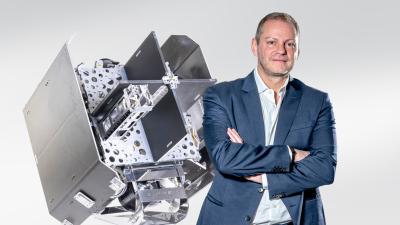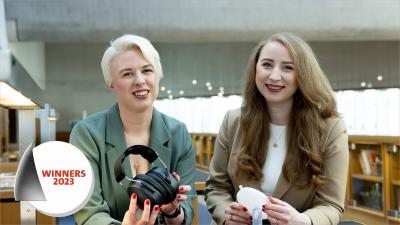Antoine Hubert and team
Vertical insect farms to produce food, feed and fertiliser
Finalists for the European Inventor Award 2023
Ÿnsect, co-founded by Hubert in 2011, was the first to receive EU clearance for a fertiliser made from insects, and the European Food Safety Authority (EFSA) declared two species of mealworms fit for human consumption based on the company’s applications.
To produce their protein, the Ÿnsect team breeds Molitor beetles in tall modular farms stacked on top of one another. They use autonomous machinery to sort, feed, heat, wash and monitor insects and then employ chemical processes to extract the nutritional content and convert this into oils and powders. Ÿnsect produces thousands of tonnes of insect protein each year, and the products have been shown to be highly nutritious for both animals and humans, containing up to 72% protein, as well as essential amino acids, vitamins and minerals.
Using insects as a food source may help to reduce CO2 emissions associated with traditional farming and reduce food scarcity. While many countries and cultures include insects in their diets, the concept has not gained global acceptance. However, Hubert is optimistic that mindsets will shift: “I think, in ten years, it's going to be the new normal. For a consumer, it won't be a surprise at all to find products in the supermarket… you will find burgers, sausages and pasta made from insects. You'll find it everywhere, so it won’t be unusual or surprising anymore.”
Metamorphosis: transforming a business with IP
In 2017, Ÿnsect received its first two patents from the EPO covering the chemical processes that extract nutrients from the shells of insects. Since then, the company has expanded its portfolio with patents which cover the autonomous breeding of Molitor beetles and the processes to transform the insects into food products. The patent landscape for insect-related technology and products was relatively small in 2014, and Ÿnsect employed an active IP strategy to secure all stages of its production early on. The company incentivises its scientists and engineers to design and build efficiently and to protect their work under patents.
While the company is growing rapidly, Hubert and his colleagues have faced several challenges: “When we first started, there were three main bottlenecks. The first was regulatory. We could sell almost no products when we started out and had to lobby throughout the sector. The second was commercial, having a commitment from the side of the customer. Customers don’t buy products just because they’re good for the environment: they have to be technically good. The third bottleneck was, of course, the technology itself […] because you need to be able to produce it on a large scale and with healthy margins.”
Media gallery
Patent numbers:
EP3240902 B1, EP3240905 B1, EP3240436 B1, EP3282836 B1 and EP3364777 B1
Press materials
Access materials for journalists
Press release: Insect-based ingredient production made possible by innovative vertical farms: French biochemist selected as finalist for the European Inventor Award 2023 Press photos/videos (for MXF format videos, please contact press@epo.org)
Contact
European Inventor Award and Young Inventors Prize queries:
european-inventor@epo.org Subscribe to the European Inventor Award newsletterMedia-related queries:
Contact our Press team#InventorAward #YoungInventors






